Buckeye Security Awareness
Buckeye is working to share cybersecurity threats and tips to help protect you and your business.
 FDIC-Insured - Backed by the full faith and credit of the U.S. Government
FDIC-Insured - Backed by the full faith and credit of the U.S. Government
Criminals are targeting businesses of all sizes. Addressing these threats requires diligence from all of us. Buckeye Community Bank is committed to helping ensure the safety of your financial identity, your financial assets, and your personal information, but we need your help. To assist you in your fight against cybercriminals and scammers, we periodically provide information and resources you can use to protect yourself. Visit this page for more safety information, as it will be updated.
If you have any questions about your accounts or feel you’ve been a victim of fraud, please contact us immediately.

Scammers are increasingly exploiting the trust we place in text messages. They impersonate legitimate organizations with messages that seem like marketing campaigns, appointment reminders or security checks involving one-time passwords.
Stay cautious and always verify before reacting to unexpected messages. Here’s how to protect yourself:

As the holidays approach, it’s a great time to travel, but it’s also a time to be extra vigilant about scams. Here are some quick tips to help you have a safe and enjoyable trip:
It’s important to remember that being cautious doesn’t mean you can’t have fun. Be smart, travel safely, and make the most of your holiday memories.

There are some great concerts still to see this year. Whether you’re looking for indie rock, electrifying pop, or soulful R&B, there’s a concert for you. It’s also an excellent time to avoid being scammed by fake tickets.
You can avoid losing money or missing out on the show by following some simple tips:
Stay smart and stay safe to enjoy the magic of live music. To help protect other fans, please report any possible scams to the Ohio Attorney General’s Office at ohioprotects.org.

Amazon Prime Day and other retailers’ summer sales are upon us. Some great deals can be found during these “shopping holidays” but they’re also prone to scams.
Do your research before you add an item to your cart, warns the Better Business Bureau. You should also watch out for scammers who pretend to be from Amazon or another retailer.
During these online shopping sales, the BBB offers these tips for staying safe:
Have fun during these shopping holidays but stay vigilant and watch for thieves and scams.

Make sure your money and financial future are protected. The number of investment scams is rising, and they can devastate you.
The expertise of professionals is essential when investing. The Ohio Department of Commerce’s Division of Securities issued an investor alert to inform and help you stay vigilant. Protect yourself and your business against common descriptions, including the areas of:
The SEC has identified some red flags of investment fraud, such as:
More investing information, plus how to check the background of an investment professional, can be found at the U.S. Securities and Exchange Commission at www.investor.gov or 800-732-0330.
And Ohio residents can find help avoiding potential securities fraud from the Ohio Department of Commerce, Division of Securities’ Investor Protection Hotline at 877-683-7841.

Financial crimes are increasingly victimizing seniors. You can protect yourself and your family by following these tips from the American Bankers Association:
Financial crimes are increasingly victimizing seniors. You can protect yourself and your family by following these tips from the American Bankers Association:
Find out how to protect yourself and your family from financial abuse by visiting the ABA tip page.
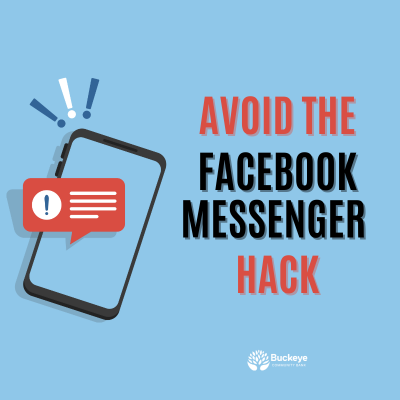
A Facebook direct message hacking scam is quickly spreading, according to cybersecurity experts.
A phishing scam known as “Look Who Died” tries to get access to your Facebook account by sending you a direct message that appears to be from someone you know and contains a link to an article about an accident that killed someone you know or perhaps a celebrity.
Clicking on the link will download malware onto your phone or computer, which provides criminals with Facebook login information. Facebook accounts are targets for scammers because they contain information such as your shopping history and photos, which allows them to send messages from your account to friends to further the phishing scam.
You should immediately take the following steps, according to security experts, if you are tricked and click on the scam link:
Visit the Federal Trade Commission at consumer.ftc.gov/scams to learn more about protecting yourself against emerging scams.

Online marketplaces provide great options if you’re looking to buy gear or sell your stuff to earn some extra cash. Avoid online marketplace scams by staying vigilant. The scammers are getting craftier, and we must be one step ahead to protect ourselves.
Here are a few tips to stay safe:

Although tax season has passed, you may still need to deal with tax issues. According to the Federal Trade Commission, tax relief companies might claim to be able to help, but they often leave you even further in debt with no help.
Some tax relief companies claim they can lower or eliminate your tax debts and stop the collection of back taxes. You can enlist their help if you pay them first. The problem is that if you pay, you may end up in debt without the promised tax relief. These scammers advertise programs that most taxpayers might not qualify for. Most of the time, these companies do not settle your tax debt, according to the FTC.
So, what are your options? You can work out a payment plan directly with the IRS for federal taxes or the state taxation department.
Protect yourself by:
For more information, visit the FTC at bit.ly/ftcbacktaxes.
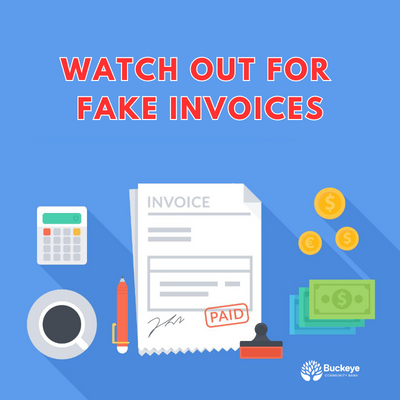
Businesses are being targeted by scammers who send fake invoices for nonexistent services or products, hoping you’ll pay. Each year, millions of dollars are lost by organizations of all sizes.
According to the Better Business Bureau’s Scam Tracker, business owners have reported fake invoices for everything from office supplies to domain hosting services. Take some steps to protect your business by:
Make sure your team feels comfortable asking questions and voicing concerns about invoices.
Report scam invoices to the Federal Trade Commission at reportfraud.ftc.gov or the Ohio Attorney General at ohioattorneygeneral.gov to assist law enforcement.

Recent news about Silicon Valley Bank and Signature Bank in New York may raise some questions. We wanted to provide you with some brief information about the situation and reassure you that Buckeye Community Bank is not impacted.
The news is not reflective of the entire banking industry or Buckeye Community Bank.
Buckeye continues to be a strong-performing community bank. We are committed to providing innovative financial solutions that are convenient, reliable, and secure to the local business community.
What Happened?
Silicon Valley Bank recently reported declines in deposits, funding, and investments. As a result, many tech and start-up companies rushed to withdraw money from the bank. The Federal Deposit Insurance Corporation (FDIC) placed the bank under receivership days later. Over the weekend, federal officials took control of Signature Bank in New York. News reports say the decision was made after the bank was negatively impacted by its cryptocurrency exposure.
Our Local Focus is Stable and Strong
Since Buckeye operates independently with a separate business model, risk management strategies, and diversified clientele, we are not affected by other banks.
According to reports, there needed to be more diversity in the clientele of distressed banks. As a result of the banks’ approach to serving niche sectors, the banks became more vulnerable and had more difficulty managing the past year’s aggressive interest rate hikes.
Buckeye’s mission remains unchanged. Our community bank remains well-capitalized and positioned to continue serving our local customers. Diversification and soundness have always been important as part of our traditional relationship-based business model.
We remain committed to our founding mission of enabling local businesses to make meaningful contributions to our community’s economy and quality of life by providing them with the financial resources and services they need to succeed.
Due to our deep knowledge of our clients and communities, we are proud to be an integral partner for our clients by making local, common-sense business financing decisions.
We’re excited to continue supporting the growth of our clients and our community. Please feel free to contact us if you have any questions about your Buckeye account.
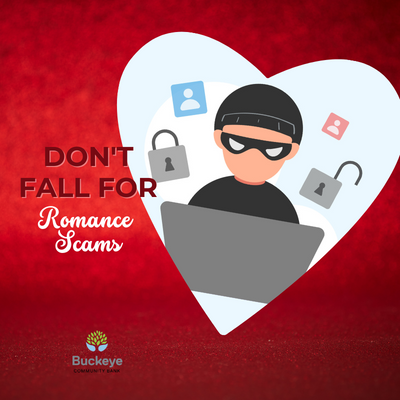
Thieves are constantly looking to take advantage of people’s most vulnerable emotions by exploiting those who use online platforms to foster new connections. This Valentine’s Day – and every day – be careful with what you share online, and never send money or sensitive information to someone you have not met in real life.
Here are some tips to avoid romance scams:
If you believe someone is trying to commit fraud or if you are the victim of a romance scam:
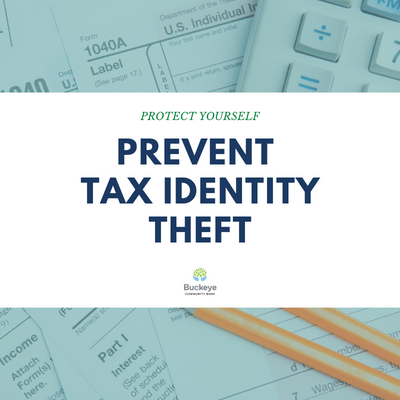
Whether or not you’re ready for tax season, thieves and imposters are already geared up.
The act of tax identity theft involves a person filing a false tax return and receiving your refund using your Social Security number. You might only realize it has happened once you try to file your actual tax return and the IRS rejects it as duplicate.
In another tax scam, imposters pretend to be IRS officials and claim you owe taxes. They demand payment immediately, usually with a gift card or prepaid debit card, and threaten arrest or other consequences. It is all a lie, and once you send money, it is gone.
Here are some ways to combat tax identity theft right now:
You can find more Federal Trade Commission resources and webinars at bit.ly/ftctaxid to protect you and your business from tax identity theft, recognize fraud and take action if you are a victim of it.
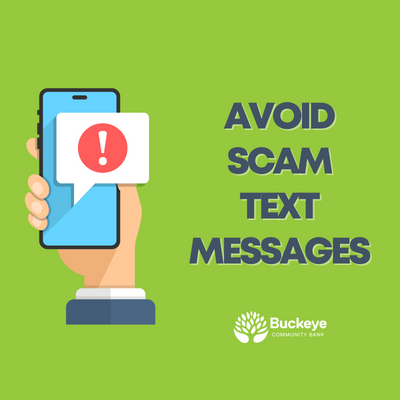
Scammers are increasingly using fake text messages to trick you into divulging personal information. Your information can give thieves access to bank and other accounts.
These text messages often contain a link that claims to let you collect a prize, pay off a loan or fix an account problem.
In this approach, criminals claim the following to get you to click and react without thinking:
•Your account is showing suspicious activity;
•There is a problem with your payment information;
•An invoice for a product you didn’t order must be paid now; or
•A shipper needs help delivering a package to you.
If you receive a text message you weren’t expecting, never click any links or respond with personal or financial information. Use a phone number or website you know is authentic to contact the company if you think the message is genuine.
The Federal Trade Commission recommends reporting unwanted texts as junk or spam in the messaging app you use and filing a report at reportfraud.ftc.gov to help filter and stop them.

How do your first car, favorite hobby and high school mascot all relate? Answering that they can be used to secure online accounts or answer online quizzes would be correct!
Think carefully before responding to a quick web quiz or personality test that appears to be just simple fun.
The more information you share online, the greater the risk thieves can capture and misuse. According to the Federal Trade Commission, scammers have increasingly been phishing for answers to security questions through online quizzes. The answers you provide could be used to reset your accounts, allowing them to access your bank and access other online accounts.
Aside from avoiding online quizzes, ensure you have strong passwords and use multi-factor authentication for your accounts. If your account requires security questions, consider treating them as different passwords and use random answers, preferably long ones. (For example, if you are asked to enter your mother’s maiden name, consider entering something like parmesan or another word you’ll remember).
If you suspect an online quiz is a phishing scam, report it to reportfraud.ftc.gov or ohioattorneygeneral.gov.
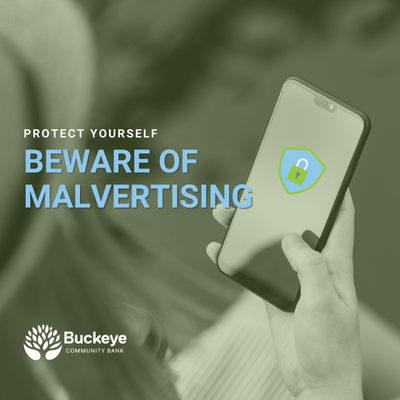
A relatively new method of cyberattack is on the rise. Malicious advertising – or malvertising – involves criminals injecting digital ads with harmful code. Because nefarious ads are displayed through real digital ad networks, most web viewers are at risk.
The corrupted code can install malicious software on computers or devices with a click. It is possible for the attacker to redirect the user then to a spoofed website or to steal personal and business information in other ways.
Despite the difficulty in preventing infection from a malicious advertising, users can take steps to reduce their risk, according to digital security firm Norton:
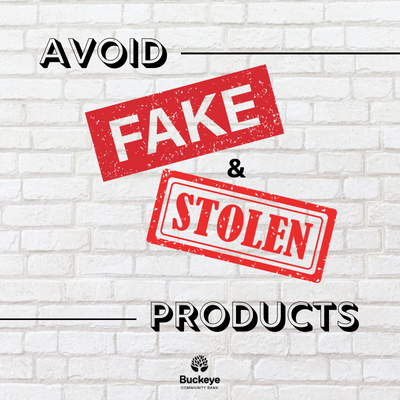
Online shopping plays a key role as we prepare for the holidays. Online shopping has led to an increase in counterfeit and stolen products being sold by fraudsters and thieves.
Counterfeiting puts all of us at risk. The AARP offers some tips for avoiding fake and stolen gifts this holiday season, including:
If you find a fake seller or products, help others and law enforcement agencies by reporting them to the Ohio Attorney General and the Federal Trade Commission.
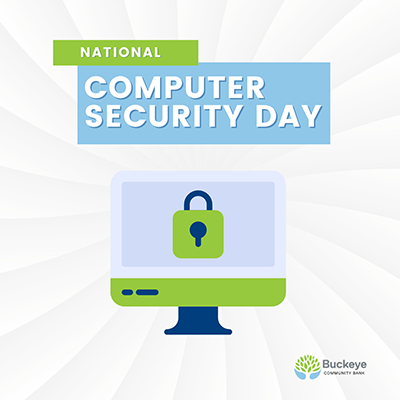
Almost every day, the news is filled with stories about cyber security breaches. National Computer Security Day is a good reminder that keeping people and companies safe online is crucial.
You can take the first steps to keeping your business and team safe by following these simple steps from the Federal Trade Commission:
• Update your apps, web browsers and operating systems
• Make sure your files are secure and backed up
• Require passwords for all devices
• Encrypt devices that contain sensitive information
• Create a security-conscious culture with routine training of all employees
Visit bit.ly/ftccyber for more ways to protect your business from the FTC.

Online shopping has grown steadily over the past few years. Cybercriminals are keeping up with the pace. Consumers most frequently report scams related to online purchases to the Better Business Bureau.
Watch out for these warning signs of a scam online store:
You can protect yourself from e-commerce scams by:
Report online retail scams to the Federal Trade Commission and the Ohio Attorney General.

It’s the season for getting or gifting the latest smartphones or devices. Before you trade in, sell, give away or recycle your current device, the Federal Trade Commission offers tips to protect your personal information, including:
Check out more specific steps to prepare for your new devices at the Apple (support.apple.com) and Android (support.google.com) sites.
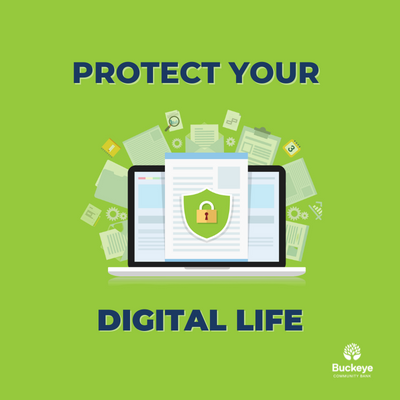
You can secure your digital devices and systems with a bit of preparation. Secure your sensitive data and computer systems with a little knowledge, effort and time. Don’t let cybersecurity intimidate you. Losing unprotected data or having your identity stolen is far more expensive than a few minutes of research, preparation and action.
The National Cybersecurity Alliance offers a few tips to stay safe online, including:
• Keeping Devices Updated
• Using Long, Unique Passwords for All Accounts
• Making Use of a Password Manager
• Using Multi-Factor Authentication
• Thinking Twice Before You Click Any Links
• Using Secure WiFi or a VPN
• Backing Up Your Digital Information
• Checking App and Account Privacy and Security Settings Regularly
You can find more details on protecting yourself online by visiting the National Cybersecurity Alliance.

Photos and stories from Hurricane Ian are devastating. Fraud can occur when natural disasters and severe weather happen, and people are especially vulnerable.
Scammers target Americans’ desire to help through phone calls, texts, emails and even door-to-door visits.
The Federal Trade Commission offers several ways to verify a hurricane relief charity:
Report scams you see at reportfraud.ftc.gov.
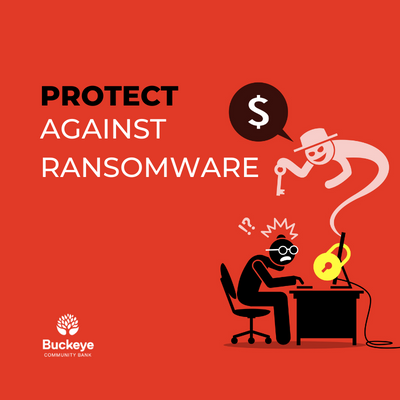
Increasingly, businesses are targeted by ransomware attacks, with hackers taking advantage of smaller-sized firms due to their lack of resources. Ransomware is malware that encrypts your computer files until a ransom is paid.
Here are some tips on how to stop criminals from infiltrating your computer system to protect you and your business:

Fake check scams continue to target consumers. According to the American Banking Association, here is what you should know to avoid falling victim. The scam usually starts with an offer to buy something you advertised, pay you to work at home or send you an advance on a sweepstake.
The following tips can help you avoid fake check scams:
Notify your bank immediately if you suspect fraud. Bank staff are experts at spotting fraudulent checks. And report attempted scams to the Federal Trade Commission at reportfraud.ftc.gov and the Ohio Attorney General at ohioprotects.org.

Keeping your business and personal financial accounts secure is extremely important. Criminals don’t need to be close by to damage your business or steal funds, so you must have strong, protected passwords.
You will never receive an unsolicited phone, text or email message from anyone at Buckeye Community Bank asking for your bank account numbers, login credentials or passwords.
Protect yourself from fraud by using strong passwords to keep accounts secure. Use these tips to protect all your online accounts:
If you have any questions or concerns about a message you receive, you can reach us at 440-233-8800.
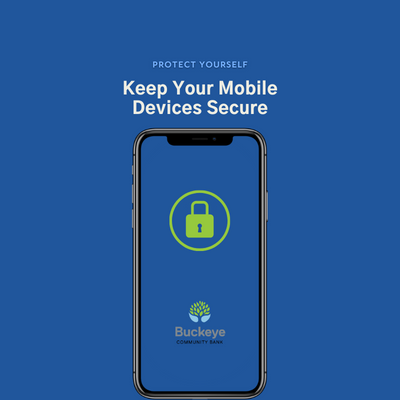
Your mobile device can be a treasure trove of information in the wrong hands. Despite its small size, it contains essential information about your bank, company, and social accounts and details about your friends, colleagues, and family.
Keep your information and money safe with the American Bankers Association tips.
Act quickly if you suspect you have been a victim of data theft by reporting it to the Federal Trade Commission (reportfraud.ftc.gov), the Ohio Attorney General ohioprotects.org and the financial institutions you use.
Find out more about protecting your business and yourself at bit.ly/buckeyesecurity.
A cyber attacker may target your business to gain unauthorized access to its accounts and data. If thieves gain control of the company’s accounts, they can make unauthorized transactions, transfer funds, add fake employees to payroll and steal sensitive business and customer information.
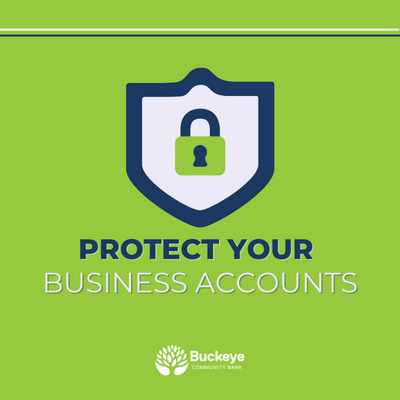
A cyber attacker may target your business to gain unauthorized access to its accounts and data. If thieves gain control of the company’s accounts, they can make unauthorized transactions, transfer funds, add fake employees to payroll and steal sensitive business and customer information.
Here are some tips from the American Bankers Association to keep your business safe:

The number of financial crimes committed against people 65 and older is rising.
The American Bankers Association offers these tips to protect yourself:
Learn more ways to protect you and your family against financial abuse from the ABA at bit.ly/stopfinabuse. And if you see potential fraud, report it to reportfraud.ftc.gov or ohioprotects.org.

Gas prices are still high, so we all want to save money. Reports are increasing of scams related to gas saving online and through unsolicited messages, according to the Better Business Bureau. A few scams include notification of winning a gas gift card and only having to pay for shipping, discounts for completing online surveys, and devices reporting to improve your fuel effectiveness. Identity thieves can gain access your account and personal information if you respond to these offers.
Protect yourself against gas savings scams:
• Never Pay to Win – legitimate companies will never ask for money to collect prizes
• Do Your Research First – verify that companies are offering savings through their official sources
• Don’t React Quickly – breathe deeply before responding to an offer, as scammers play on your excitement and think you may ignore suspicious details
• Avoid Useless Gadgets – some gadgets, such as fuel-line magnets and injector improvers, promise to improve fuel efficiency but could severely damage your engine
Use tried-and-true methods to drive more efficiently, such as following a regular vehicle maintenance schedule, observing speed limits and using trusted local service professionals.
Act quickly if you suspect you have been a victim of fraud or scams by reporting them to the Federal Trade Commission or Ohio Attorney General.
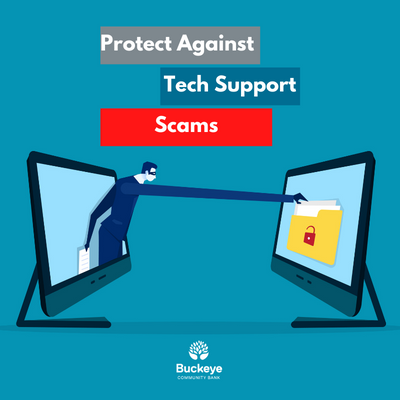
If your computer or device is acting up, it is still a target for scammers trying to steal your business and personal information.
While scammers take advantage of reasonable concerns about viruses, their goal is not to protect your computer. Instead, they try to sell you useless services or install malware that gives them access to everything on your computer.
You can protect yourself and your team from tech support scams with the following tip:
Act quickly if you suspect you have been a victim of fraud. Contact your bank or credit card company to block any unauthorized transactions. Any possible scams can be reported to the Federal Trade Commission through reportfraud.ftc.gov or the Ohio Attorney General at 800-282-0515 or ohioprotects.org.
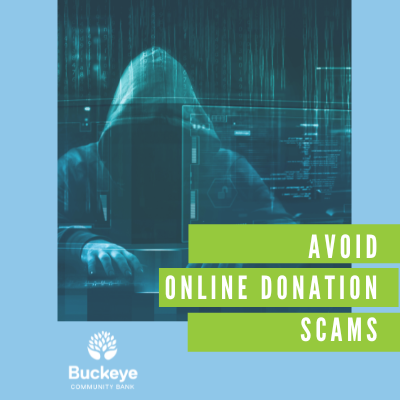
It is common to see heartbreaking stories and pictures online about someone or a cause asking for donations. As powerful as social platforms can be for organizing collective action and fundraising, there are sometimes scammers behind the plea bent on stealing your money and personal information.
You can protect yourself by ensuring your generosity goes to valid causes. Here are some tips from the Federal Trade Commission and Better Business Bureau:
If you see red flags, report them to reportfraud.ftc.gov or ohioprotects.org.

Are you confused about cryptocurrencies? Don’t worry, you’re not the only one.
Cryptocurrency is a form of payment that can either be exchanged online for goods and services or held as an investment. Using blockchain technology, it manages and records transactions across many linked computers. Cryptocurrencies can be bought through an online exchange platform or earned through a complex mining process.
The Ohio Attorney General advises doing your research first because cryptocurrency is complex and not regulated by any state or federal government agency. Here are some common scams to watch out for:
Learn more about cryptocurrency and scams from the Federal Trade Commission and report problems to the Ohio Attorney General.
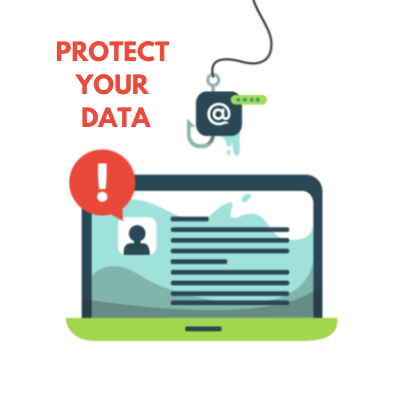
Phishing is the most common cyber scam and is becoming a more significant threat. A phishing attempt involves posing as a trusted source, usually via email or text, to trick an individual into revealing sensitive information. Criminals know consumers are likelier to click on a link that looks official. To protect yourself from phishing, you can take the following steps:
Remember no one from Buckeye Community Bank will ever ask you unsolicited to provide information like your Social Security number, bank account numbers, account logins or business tax information. If you have any questions or concerns about a request that you receive, feel free to call us at 440-233-8800.
Find more information to protect your business, or to report scam attempts, by visiting the Ohio Attorney General’s Office and the Federal Trade Commission.

Increasing temperatures signal the start of the season for home improvement projects. Even though most local contractors are reputable and do fantastic work, this season also brings out scammers. You should do your homework before hiring any contractor.
Here are some tips from the Ohio Attorney General’s Office to protect yourself from scams and unscrupulous contractors:
Check out a company’s reputation and learn how to protect yourself by visiting the Ohio Attorney General’s Office and the Better Business Bureau.

Social media is an integral part of many people’s lives. According to the Federal Trade Commission, social media is also increasingly being used by scammers because it is the most profitable way for them to reach consumers. Last year, more than 1-in-4 people reported losing money to a fraudulent advertisement, post or message on social media.
You can raise your protection with a few steps:
Visit ftc.gov/scams to learn more about the newest scams or to report fraud.

Cybersecurity is now more critical than ever. Being aware can help you keep your business information secure.
Set up firewalls and encrypt data to prevent criminals from gaining access to sensitive information.
Discuss with your employees their role in securing and protecting the information of their colleagues, customers, and the company. Establish policies so everyone knows what is acceptable and what is not permitted.
Develop policies that protect your company against attacks and provide guidelines for resolving issues when they arise. Be sure to outline how various situations will be handled and the consequences if a policy violation occurs.
Teach your team how to recognize fake warnings and alert your IT experts when they notice anything suspicious.
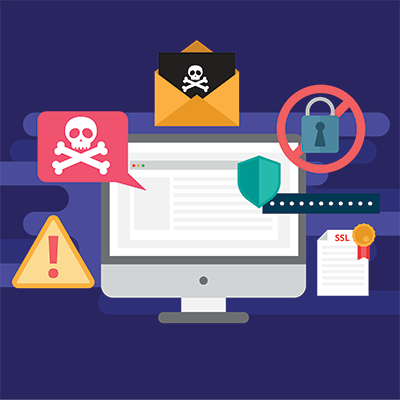
This week is National Consumer Protection Week, making it the perfect time to protect yourself against identity theft and financial fraud. Be vigilant because the bad guys are working overtime to separate you from your identity and money.
Here are a few steps you can take to protect yourself:
Find more tips and resources to protect your information and accounts at consumer.ftc.gov.
Cybercrime can have a significant negative impact on your business if proper precautions are not taken to prevent it. Being aware can help you keep your businesses information secure.
Protect your networks by setting up firewalls and encrypting information. This will help minimize the risk of cyber criminals gaining access to confidential information. Make sure your Wi-Fi network is hidden and the password protected. Make sure to be selective of the information that is being stored in the company databases. Databases can be a great means for companies to have a central location of data and documents, but this does not mean it is favorable to store any and all information. Automatic backing up of company data should be set to be completed either once a day or once a week, depending on the level of activity within your company. Backing up your company’s data will increase the likelihood that with a cyber attack, your company’s data will not be lost completely, which is all too common.
Talk to your employees about their role in securing and protecting the information of their colleagues, customers, and the company. Have policies set in place so they know what practices are acceptable and unacceptable. Limit the number of users within the company who will have administrative access. This will minimize the amount of programs they will be able to download, therefore, minimizing the risks of downloading viruses and malicious software.
Establish practices and policies to protect your company from cyber attacks and provide guidelines for resolving issues if they arise. Make sure to outline how situations will be handled and the consequences if an employee violates the policies. Control physical access to company devices and dispose of them properly. Prevent access to company computers and handheld devices from unauthorized users. Laptops and cellphones are easy targets for cyber theft since they can be misplaced easily or stolen quickly. Reset devices that are being disposed of back to factory setting. Never get rid of a cellphone or laptop without completing this step. Failure to do so could result in company information winding up in the hands of the cyber criminal.
Train your employees to be able to recognize fake antivirus warning messages and alert IT as soon as they notice anything questionable occurring (if necessary). Make sure your company has a policy in place for the steps to be taken should an employee’s computer become infected with a virus. Malware is a sneaky program that can obtain information by making its way onto devices via the Internet, social media, email, attachments, and downloads. For example, key-logging malware can track everything the user types on their keyboard. This means cyber criminals could access bank accounts, customer information, passwords, and other company-sensitive information. Make sure to keep your security software up-to-date to help prevent malware from sneaking onto your system and networks.
Source: Office of Consumer Affairs and Business Regulation, State of Massachusetts